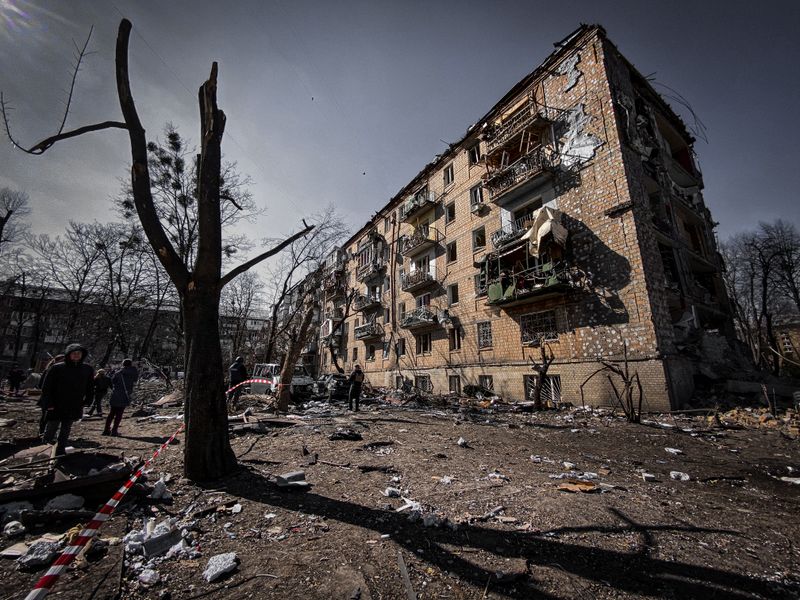‘Scary’ Earthquake Hits Stoke-on-Trent, Leaving Residents Shaken
A Night of Tremors
Last night, the city of Stoke-on-Trent experienced a 3.3-magnitude earthquake, leaving residents in shock and houses shaking. The epicenter of the earthquake was beneath Tean, and it occurred at 9:21 pm on Wednesday, June 28. According to the British Geological Survey, this was the most significant tremor to hit the UK in the past two months.
Reports from StokeonTrentLive indicate that the earthquake was felt across a wide area, including Tean, Cheadle, Blurton, Basford, Bradwell, Biddulph, Trentham, and Weston Coyney. Numerous individuals shared their experiences of the earthquake, expressing feelings of fear and shock.
Tales of Fear and Shaking Homes
David Rayner, a resident of Stoke, recounted, “I felt it here in my high-rise flat in Stoke. I was sitting on the settee in my bedroom watching television when the flat shook for about three seconds.”
Heather Hughes, who lives in Bucknall, shared, “I felt it in Bucknall, it felt like someone running behind the settee and shaking it.”
Ant Leese, a resident of Weston Coyney, said, “I live in Weston Coyney, and I thought something had hit our house the way it shook.”
Marie Elkes, who lives in Longton, added, “I felt our house shake.”
Alison Rushton described her experience as scary, saying, “The whole house was shaking.”
Pauline Lewis, in Moss Green Village, felt her seat shake and observed, “The cupboard next to me has glass doors. They shook, and I felt my seat shake too.”
Nicola Moore, who had a nest camera, mentioned, “It sounds more like an explosion than a quake, but I thought something had gone into the house.”
However, not everyone in Stoke-on-Trent felt the tremors. Pam Meigh, a resident of Bentilee, said, “I live in Bentilee and never felt or heard anything.” Natalie MacGregor from Birches Head also confirmed not experiencing anything.
Earthquakes in the UK
While earthquakes may not be common in the UK compared to other regions around the world, they do occur sporadically. The British Geological Survey is responsible for monitoring seismic activity and providing information to the public. It is essential to remain prepared and informed about earthquake safety measures, even in areas not typically associated with seismic activity.
Philosophical Discussion: The Power of Nature
Earthquakes, like other natural disasters, remind us of the immense power of nature and our vulnerability as human beings. In a world where humans have made significant advances in technology and infrastructure, it is crucial to remember that we are still subject to the unpredictable forces of nature. Earthquakes serve as a stark reminder that despite our attempts to control and manipulate our environment, we are ultimately at the mercy of natural phenomena.
These events can evoke a range of emotions, from fear and anxiety to awe and wonder. The sudden shaking of the ground can disrupt our sense of stability and security, reminding us of the fragile and transient nature of human existence. It is during these moments that we are confronted with questions of our place in the world, our relationship to nature, and our ability to adapt and respond to unforeseen circumstances.
Editorial: Preparedness and Community Resilience
While the earthquake in Stoke-on-Trent was relatively minor in magnitude, it serves as a reminder for communities to prioritize preparedness and resilience. Individuals and households should ensure they have emergency plans in place, including knowledge of evacuation routes, emergency contacts, and essential supplies.
Furthermore, local authorities and organizations should work collaboratively to educate the public about earthquake safety measures and establish robust response systems. This includes conducting regular drills, improving building codes and infrastructure resilience, and developing effective communication channels to disseminate information during emergencies.
Ultimately, community resilience is built on a foundation of strong social connections. In times of crisis, it is the support and cooperation of neighbors and fellow community members that can make a crucial difference. Encouraging community engagement and fostering a sense of responsibility for one another’s well-being can help strengthen resilience and promote collective action.
Advice: Steps to Take After an Earthquake
If you find yourself in an area affected by an earthquake, here are some essential steps to take:
1. Stay Calm and Seek Safety
Remain calm and find a safe place to take cover. Move away from windows, heavy furniture, and other potential hazards that could cause harm during aftershocks.
2. Check for Injuries
Assess yourself and those around you for injuries. Administer first aid if necessary and seek medical help for severe injuries.
3. Assess the Safety of Your Surroundings
Inspect your surroundings for immediate dangers, such as gas leaks, electrical hazards, or structural damage. If you suspect any of these hazards, evacuate the area and contact emergency services.
4. Follow Official Instructions
Listen to local authorities and follow their instructions regarding evacuation or sheltering in place. Stay tuned to emergency broadcast systems for updates and guidance.
5. Check on Loved Ones
Reach out to family members, friends, and neighbors to ensure their safety. Offer assistance if needed and check on vulnerable individuals, such as the elderly or those with disabilities.
6. Document Damages
Take photos or videos of any damages to your property for insurance purposes and future reference.
7. Have Emergency Supplies Ready
Keep a well-stocked emergency kit with essentials such as food, water, medications, batteries, flashlight, and a portable radio. Familiarize yourself with the contents of the kit and ensure it is easily accessible.
8. Seek Emotional Support
Reach out to friends, family, or support networks if you are feeling overwhelmed or distressed. It is normal to experience a range of emotions after an earthquake, and seeking support can help in the healing process.
Remember, earthquakes can occur unexpectedly, and being prepared can make a significant difference in ensuring your safety and the well-being of your community.

<< photo by Алесь Усцінаў >>
The image is for illustrative purposes only and does not depict the actual situation.




